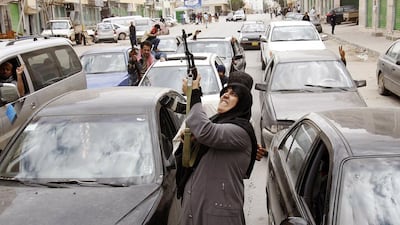Earlier this week, Libyans marked the fourth anniversary of their revolution. While the uprising succeeded in overthrowing Muammar Qaddafi in 2011, Libya stands in the midst of huge challenges today, leaving many to wonder: should the West and others have intervened in 2011?
Many will look at the tragedies that have befallen Libya since and say they provide a clear justification to say no.
Indeed, many times since Nato bombed Qaddafi forces in 2011, a series of objections have come from the West, mostly on the left, but also some on the right wing of the political spectrum. They argue that when the West engages militarily abroad, the results are always going to be catastrophic. Many also link that intervention in 2011 to the recent rise of ISIL in Libya.
It is a tempting argument, but it’s also incomplete. It fails to answer two major questions. The first: did Libyans want a Nato intervention? In 2011, those fighting against Qaddafi wanted action to save Benghazi, and even today few Libyans argue that there should have been no intervention.
The second question relates to the initial impetus behind the intervention – and that was what was happening in Benghazi, with Gaddafi’s forces advancing. Left unchecked, there was every indication there would be huge civilian casualties in the city at the hands of the regime. Without Nato intervention, Benghazi would surely have paid a heavier price.
Qaddafi wasn’t likely to allow his people to protest. His forces were killing demonstrators, and would have killed scores more. Would it have been better for another force, perhaps a pan-Arab force, to have gone to protect civilians without Nato? Possibly, but that was not on the table.
Opponents of intervention have a better case when it comes to how the war was conducted in 2011. Any military commander will agree after the campaign is completed that his war could have gone better. Crucially, however, opponents of intervention miss a far better case altogether, which does not relate to the notion of intervention itself – but what followed.
Much of what we see today in Libya is not down to the decision to intervene, but how the intervention was then pursued, and what happened after the international community departed. The country’s institutions had been hollowed out by decades of Qaddafi and chaos filled that void.
If the opposition to that intervention is down to the very notion of intervention by the West, then we have something of a moral dilemma. Would it have been immoral, for example, for the West to intervene in Rwanda, to prevent the genocide there? On the contrary, most would argue today that the fact the international community abandoned Rwanda was a moral depravity. Not all international interventions are going to be similar to Iraq. The West’s intervention in Kosovo, for example, worked out much better.
It is appropriate that because of the experience of Iraq, many will flinch before recognising the validity of an international intervention. It is also reasonable to ask serious questions about why one particular country warrants an intervention as opposed to another. It is also important to point out the double standards implicit therein, as well as how the intervention is actually carried out. All of this is, indeed, very important to do.
But to simply say no, without providing realistic alternatives, is not good enough. Air strikes against Bashar Al Assad’s forces in Syria, for example, were thwarted by the left in the UK, and the result was lauded as a victory. But how can it be a victory when Mr Al Assad’s forces continue to kill thousands of Syrians? A victory would have been providing a better option. Simply saying no isn’t good enough, even if it is part of the solution. The same is true about Libya in 2011.
Where does that leave Libyans today? That’s for them to decide. But in casting their minds back to 2011, wondering if it was the right decision or not, they might want to consider two questions. Was it their choice or was it Qaddafi’s? Surely, it was Qaddafi who could have easily avoided altogether the need for any violence in 2011.
And secondly, were their motives noble in rising against Qaddafi? It has become almost fashionable to cast aside the aspirations of the Libyans who said “enough” four years ago. But they only asked for what so many of us in the world take for granted – the ability to choose. They were inspiring then and their story is not over. Yes, Libya finds itself in the eye of the storm today – but all storms end, and the sun does return.
Dr HA Hellyer is an associate fellow of the Royal United Services Institute in London, and the Centre for Middle East Policy at the Brookings Institution in Washington DC
On Twitter: @hahellyer


